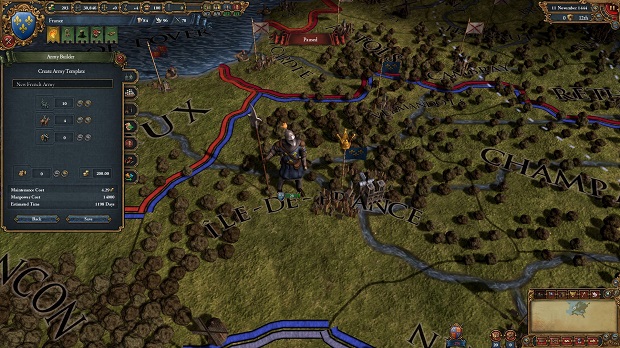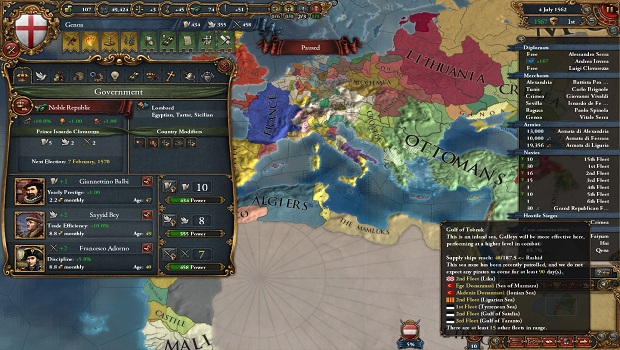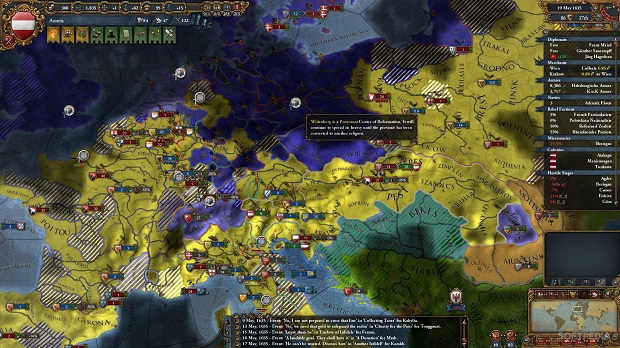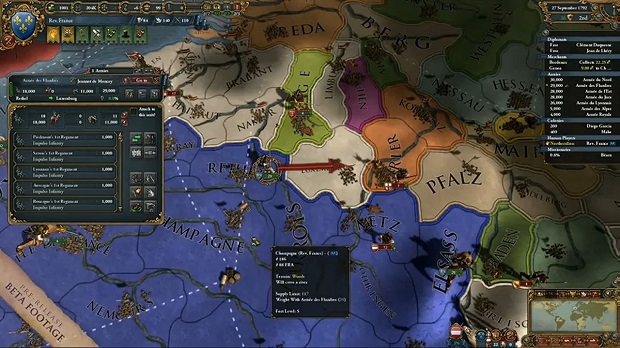War. War never changes. That is, unless you pick up The Art of War expansion to Europa Universalis IV, in which case war has just changed a great deal. Paradox once again has taken an excellent product and made it even better, with an expansion that adds a great deal of color to the events of the game (particularly the 30 Years War), dramatically alters and improves the game map, and upgrades the production model to reduce micromanagement and leave you to what brought you here: conquest and expanding your empire.
One of the more time consuming elements of Europa Universalis is constructing an army. The Art of War adds a feature allowing you to design an army prototype, built with your ideal specifications in mind. The game will then allow you to build that prototype. You’ll choose the destination province, and all the necessary units will be built at a number of provinces you specify automatically- previously, you had to build them in each province individually. Then, as they are completed, they will all march to the destination province to await your orders. It’s a fantastic feature that dramatically speeds up army construction- the lengthy pauses I used to make to put together my ideal force have been all but eliminated. It’s an excellent concession to playability.
There are many other changes to the game’s warfare model. These include the ability of province garrisons to sortie against besiege forces, and give orders to subject nations on how you want them to behave in war. You can even suggest to allied nations which provinces to besiege. These are solid changes, which alters some of the randomness you seemed to get from the behavior of allied nations in war. There’s less guess work when you know how those countries you’re going to war with as allies are going to behave when the conflict begins.
There have been some really solid changes to the naval model. You can now sell out-of-date ships and place fleets into a mothball state when desired. These two changes will save you a lot of money, plus add a solid level of realism to the game. After a long war for Sweden’s well deserved domination of the Baltic Sea, it was nice to be able to kick my fleet into mothball and recover my treasury quickly. I also had the option (though I declined at the time) to upgrade my ships in the fleet all simultaneously. This is the biggest success of the Art of War: streamlining gameplay.
As I mentioned, I played as Sweden. This expansion adds a ton of events to the 30 Years’ War, and with Paradox’s Swedish roots, and the fact that the country was a key player in the conflict, I dove into that conflict with gusto. I was well entertained by defenestrations, religious disagreement, and the role I seized as Defender of the Protestant Faith. Mostly, I warred to maintain a foothold on the southern shore of the Baltic against Polish aggression. The swirling and long conflict that was the Thirty Years’ War now finally has the game needed to fully represent its scope and devastation, as Paradox has finally added the necessary extras to flesh out the conflict into a completely realized form. The addition of the Catholic and Protestant leagues is a key factor in making the conflict expand in the way that it did- though I didn’t really enjoy suddenly finding enemies on all sides.
As has become typical of Paradox expansions, there was a lot of free content released right alongside the expansion. Here, they’ve tossed on some 900 changes to the map, with sweeping changes to Asia, Africa and the Americas. There were so many changes that I didn’t use the fantastic randomized Western Hemisphere option from Conquest of Paradise just to get in the new experience. If there was anything about the old map that bugged you, it’s probably been fixed here. The patch also tossed in significant changes to the way rebellions work, tying them more to movements than to single provinces. And, if you have the expansion, you can even declare war on behalf of another country’s rebels.
Once again, Paradox has taken a game that was fantastic before, and launched an add-on that took the experience to another level. And if you haven’t yet dived into Europa Universalis IV, the amount of streamlining the experience has undergone will help tighten up your new experience immensely. Piloting a nation through years of peace and war only get better with The Art of War.
The Art of War was reviewed using code provided by the developer.



